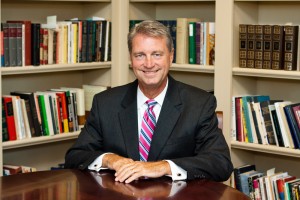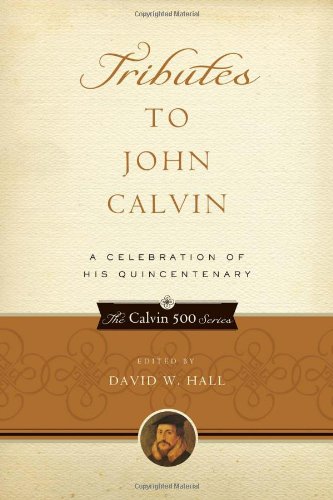Welcome again to Books At a Glance. I’m Fred Zaspel, and we’re talking one more time with Dr. David Hall about the Protestant Reformation – this time John Calvin and Church maturity.
David, welcome back—it’s been great to have you with us, and we appreciate your input.
David Hall:
It’s been fun, thank you.
Zaspel:
What did Calvin write about church order? And were these general biblical principles or to prop up an ecclesiological structure?
Hall:
That’s the chicken and the egg question which I like to begin with. It’s important to understand that when Calvin wrote he was, above all things, trying to return to Scripture. He was trying to scrape off years of accretions and structures and traditions from the government of the church. And, as he went about his work he wanted to get back to the Scriptures. As such, it must be remembered, that there is no Protestant church in Geneva. There’s no denomination, as we think of, prior to Calvin’s arrival in Geneva other than, literally, about six weeks. There’s not a long history or tradition or structure to any of these Protestant churches in Europe. So when they were formed, one of the first orders of business, one of the first things that had to demand their attention was, why do you govern the church in a certain way that’s so starkly different from medieval Catholicism? And Calvin set his hand to that in a couple of places. His longest single book of The Institutes, Book 4, is all on the church. He devotes a very lengthy, almost repetitious, long treatise discussing the abuses of Roman Catholicism, the errors of that, and tried to simplify the church. It helps me to view Calvin’s recommended changes to the church as an ecclesiology of liberty. He was trying to set the church free from all of these layers of administration. And as such, he had a simplified view. I think Roman Catholic clergy had on the order of 11 or 12 different orders at the time, just as there were many more sacraments. Calvin tried to simplify church structure and his view maintained that there were four offices in the New Testament church that should continue. Those were, of course, as most people would agree, elders, number one; deacons, number two; thirdly, pastors, which he saw as a different office from the office of governor or elder; and then the fourth office was that of teacher. From his own experience he thought that, and Ephesians certainly speaks of pastors and teachers. So, Calvin had this four-office view that was streamlined compared to the medieval church. And he wanted to promote the freedom of the church, the freedom of the church to be what God had designed it to be.
Now, a really interesting story is that one of the first major Protestant polities or church government was his Ecclesiastical Ordinances, which was originally compiled and approved in 1541. I could tell you a short story. That was one of his conditions of returning to Geneva. I think we spoke about his exile. He was exiled after being there less than two years. Here’s a young, promising scholar-preacher who is begged to come to Geneva. He comes in, he settles in, and in less than two years he was shown the door. So, young pastors who are listening, don’t be discouraged. He was exiled to Strasburg. In three years, he came back to Geneva – a real task of bravery and commitment to the church. And one of his conditions was, I’ll not come back unless you allow the church to be free from the civil government, from the magistrates, from the city Council. And in order to do that, he was commissioned, and agreed, by the city Council, the city rulers of Geneva at the time, to allow the church to develop its own manual government, and that’s called the Ecclesiastical Ordinances. Those went through several revisions, but that’s the primary source where you can find Calvin’s view on what the church should be doing, what its government structure should be. That being said, let me just say, this isn’t a terribly lengthy document. Don’t think of a huge denominational mature book of church order that’s several hundred pages. It’s a sketch; it’s a skeleton; and that was groundbreaking for its time, but it was also enough. It went through several different periods of development. But the Ecclesiastical Ordinances was Calvin’s attempt to lay out how the ministry should be carried out on a regular basis.
Zaspel:
Did Calvin have something to say, then, about the relation of the church and state?
Hall:
Well, he had a lot on both topics, as you might imagine. And in Book 4, the final chapters on the civil magistrate, that’s Chapter 20, but the other 19 chapters are all on church government structures, sacraments, ministry. But there’s a wonderful parallelism. Scholars call this homology, or the same set of principles. There’s an internal consistency in Calvin’s views of government, whether it’s in the civil realm or the ecclesiastical realm. And, in some, he advocated a dispersed government with multiple rulers, not one. His management structure, in other words, was not a hierarchy, not the triangular shape of Roman Catholicism or Bishop oriented governments. But it was one that had multiple rulers, trusting that in a fallen world with depravity, we ought not entrust more power or authority to any one individual, even a sanctified individual, even a sanctified individual like John Calvin, to run the church. I always think it’s very interesting to see that when he could have demanded other things when he returned to Geneva, when he could’ve asked things that would have given him and even stronger hand as a dictator, based on his study of Scripture, he refused to do that, and thought that the church would be better over the long haul to have multiple counselors, as Proverbs says, there’s a wisdom in many counselors, and to be under a form of government that was fixed.
Zaspel:
So we see reflections of Calvin’s views of church government in civil government still today, right?
Hall:
Yes, you do. And you see a collegial approach. One that has an emphasis on accountability. One that has emphasis on covenant, on objective or written documents that the believing community would agree to. One of the amazing inventions, that some people call an invention, that actually was a return to an earlier, more apostolic pattern, was that Calvin erected what he called the venerable company of pastors of Geneva. They would meet weekly to discuss matters of discipline, matters that were pressing the church at the time. They would discuss theological topics and all the challenges. And Calvin would bring together the elders of the church, the pastors, in a regional body to determine things, stressing the unity of the church rather than just what one man at the top of the pyramid wished to do.
Zaspel:
What did Calvin have to say about the congregation?
Hall:
Well, the congregation was the community of the faithful that were called out by God. And he called them to hear the Word and to make decisions based on the Word; but most of the governing functions were entrusted to a representative government that was led by the elders and pastors jointly.
Zaspel:
We’re talking to Dr. David Hall about the impact of John Calvin, which, as we have learned, extends to a good many areas of life. It’s been a great series of discussions, David—thanks so much for talking to us here at Books At a Glance. It’s been great to have you.
Hall:
Thank you, Fred; God bless.
Editor’s Note: Here are some related resources from Dr. David Hall
Tributes to John Calvin: A Celebration of His Quincentenary
wtsbooks
Amazon
Lectures on Integrity: A Review of Confessional Subscription as an Aid for Orthodoxy and Orthopraxy
Amazon
Post Tenebrae: Essays on Calvin and Calvinism
Amazon
The Genevan Reformation and the American Founding
Amazon
To Glorify and Enjoy God: A Commemoration of the 350th Anniversary of the Westminister Assembly (co-author with John L. Carson)
wtsbooks
Amazon
The Legacy of John Calvin (2008)
wtsbooks
Amazon
Calvin and Commerce: The Transforming Power of Calvinism in Market Economies (2009)
wtsbooks
Amazon
Preaching Like Calvin: Sermons from the 500th Anniversary Celebration (2010)
Amazon
Calvin in the Public Square: Liberal Democracies, Rights and Civil Liberties (2009)
wtsbooks
Amazon
Essays in Calvin and Calvinism (kindle editions, 2014-2015)
Volume 1
Volume 2
Volume 3
A Theological Guide to Calvin’s Institutes: Essays and Analysis (2008, 2015) (with Peter Lillback)
wtsbooks
Amazon
Calvin and Culture: Exploring a Worldview (2010) (with Marvin Padgett)
wtsbooks
Amazon

